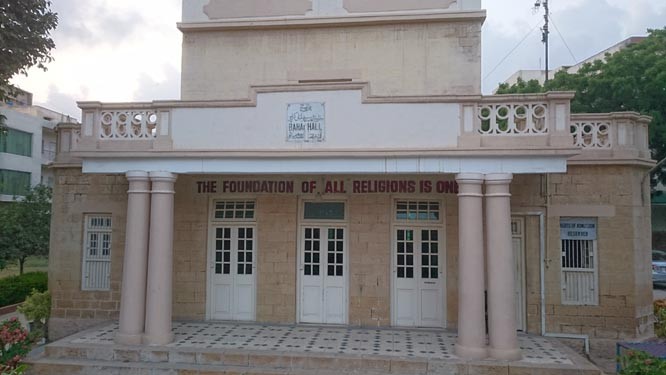
Though the smallest religious minority of the country vows non-involvement in partisan politics, Bahai community votes as part of its principle of obedience to government

As Pakistan gears up for the July 25 general elections, the smallest religious minority of the country remains unmoved, because one of the social principles of the Bahai faith is non-involvement in partisan politics. The community will still vote, however, because they vow to be obedient to the government.
There are an estimated 7.5 million registered voters in Karachi right now, but 180 of them are forbidden by their faith, for the rest of their lives, to disclose to anyone who they voted for. If any of these Bahais were to reveal this information, they would be penalised.
The possible penalties include the withdrawal of their right to vote in the election of their spiritual assemblies, which govern the affairs of their faith.
"Bahais are strictly prohibited from taking part in partisan politics," Riaz Ahmed Shirazi, a senior member of the Bahai community, told The News on Sunday.
"For violation of our religious codes, the administrative body or the spiritual assemblies at local and national levels have the right to reject the opinions of such persons."
He said Bahais believe in the privacy of their votes as a mark of respect. "Political parties accuse and expose their opponents, and never miss an opportunity to blame them for every ugly incident."
The principle of keeping one’s vote private also applies to the election of their spiritual assemblies. Shirazi said Bahais have local spiritual assemblies in almost every major city of Pakistan.
Community members aged 21 and above gather each April to elect their nine-member assemblies, he added. "When we elect a local spiritual assembly, only God knows who voted for whom."
Bahais have a simple voting process for their spiritual assemblies. They offer a blank piece of paper to every voter, who writes down names of nine people whom they wish to make a member of the assembly.
The nine most repeated names are then tasked with carrying out the Bahai community’s spiritual responsibilities for a year or until the next assembly is to be elected.
Bahais do not hold a contest between members or campaign for any of them during the election of their spiritual assemblies. To be eligible, however, all of the nine members should be Bahais, committed participants in religious activities and mentally active.
Shirazi said Bahais believe in bringing people together and ending all differences between them. "We can’t permit Bahais to become tools of unprincipled politicians, because love and mutual respect can’t be achieved through dirty politics."
Azizullah Lor, another senior Bahai community member, said their faith is based on the simple philosophy of spreading love and respecting all human beings, but partisan politics causes rivalries.
Lor said the Bahai population of Pakistan is between 3,000 and 4,000. Since they cannot bring a major change in the political landscape of the country, it is a waste of time, money and energy to augment antagonism among the people, he added.
This world was not created for hate, he said. "Bahais can’t support a person who takes part in politics. Religious matters deal with spiritual or non-material values. They shouldn’t be mixed with politics, which focuses on material ideals."
Lor said politics, particularly partisan politics, divide the people instead of bringing them together, as most political parties pit people against one another by creating misunderstandings between different groups. "Party politics reinforces the idea of ‘us versus them’", he added.
However, he said, the Bahai faith discourages all forms of dictates. "Our children have the right to believe or not believe in our religion. When our children become adults, they can choose to follow or quit our faith."
One of the sections under the topic of ‘Detachment’ in ‘Illumine My Spirit: Bahai Prayers and Meditations for Women’ reads: "O handmaid of the Lord! Speak thou no word of politics; thy task concerneth the life of the soul…"
On May 25, 1992, the Universal House of Justice, the supreme ruling body of the Bahai faith, directed that active support of an individual who has announced his candidacy for political office is not permissible to Bahais.
Abdul Baha, son of Bahai faith founder Bahaullah, had provided clear instructions regarding the community’s abstention from political matters: "If any person wishes to speak of government affairs, or to interfere with the order of government, the others must not combine with him because the Cause of God is withdrawn entirely from political affairs."
He said the political realm pertains only to "the rulers of those matters; it has nothing to do with the souls who are exerting their utmost energy to harmonising affairs, helping character and inciting [the people] to strive for perfection. Therefore, no soul is allowed to interfere with [political] matters, but only in that which is commanded."
The provisional results of the 2017 national census put Karachi’s population at 14,910,352 against 9,339,023 registered in the 1998 count, showing a growth of 59.66 per cent.
The Bahai community in the metropolis, however, is a drop in the ocean. There are only 45 families, with an estimated 380 members, who reside in different parts of the city. They have sectors of five to six families in their respective localities that function under Karachi’s spiritual assembly.
To ascertain the exact number of Bahais, The News on Sunday contacted the Pakistan Bureau of Statistics, but its deputy census commissioner, Muhammad Riaz, said community-wise data was not collected during last year’s population and housing census.